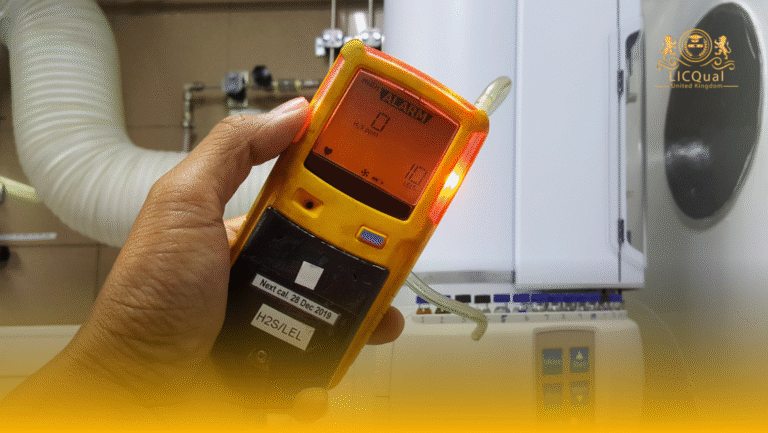The LICQual Level 3 Award in Computer Networking is an advanced qualification tailored for learners aiming to deepen their expertise in network technologies. Building on foundational and intermediate knowledge, this course explores sophisticated networking concepts, equipping learners with the skills required to manage, configure, and troubleshoot modern network environments. Whether you’re pursuing a career in network administration or preparing for professional certifications, this award offers a solid, hands-on approach to advanced computer networking.
Throughout the course, learners will engage with key topics such as advanced IP addressing and subnetting, VLANs, routing protocols like RIP and OSPF, and the fundamentals of network security. In addition, students will develop practical skills in configuring wireless networks and applying diagnostic techniques to resolve complex issues. The curriculum integrates real-world scenarios and tools, ensuring learners can confidently apply computer networking concepts in professional settings.
This qualification is designed to meet international standards and aligns with industry-recognized competencies such as those outlined by Cisco and CompTIA. The course content is suitable for individuals preparing for roles in network engineering, IT infrastructure, or cybersecurity. With a strong focus on applied knowledge, the LICQual Level 3 Award enables learners to develop the technical and analytical abilities required in advanced computer networking roles.
The training is delivered over two intensive days and is ideal for those with prior networking experience or qualifications at Level 2. Learners will benefit from instructor-led sessions, guided labs, and scenario-based exercises that reinforce theoretical understanding. By the end of the program, participants will be capable of designing and maintaining more secure, scalable, and efficient computer networking environments.
Completing the LICQual Level 3 Award in Computer Networking positions learners for upward mobility in the IT sector, whether continuing to Level 3 Certificates and Diplomas or moving directly into the workforce. This course is an essential step for those pursuing professional growth in the networking domain. As businesses increasingly rely on complex digital infrastructure, skilled professionals in computer networking are in high demand—making this award a powerful addition to any technical portfolio.
Course Overview
Qualification Title
LICQual Level 3 Award in Computer Networking
Total Units
6
Total Credits
6
GLH
18
Qualification #
LICQ2200460
Qualification Specification
To enroll in the LICQual Level 3 Award in Computer Networking applicants must meet the following criteria:
|
Qualification# |
Unit Title |
Credits |
GLH |
|---|---|---|---|
|
LICQ2200460-1 |
Advanced IP Addressing and Subnetting |
1 |
3 |
|
LICQ2200460-2 |
VLANs and Inter-VLAN Routing |
1 |
3 |
|
LICQ2200460-3 |
Routing Protocols (RIP, OSPF) |
1 |
3 |
|
LICQ2200460-4 |
Network Security Fundamentals |
1 |
3 |
|
LICQ2200460-5 |
Wireless Networking Concepts |
1 |
3 |
|
LICQ2200460-6 |
Troubleshooting Network Connectivity |
1 |
3 |
By the end of this course,applicants will be able to:
1. OSI and TCP/IP Networking Models
- Explain the purpose and structure of the OSI and TCP/IP models.
- Identify and describe the functions of each layer within both models.
2. Ethernet Standards and Cabling
- Understand common Ethernet standards and their applications in networking.
- Identify and select appropriate cabling types for specific network environments.
3. IP Addressing and Subnetting Basics
- Demonstrate the ability to calculate IP addresses and subnet masks.
- Explain the importance and purpose of subnetting in network design.
4. Introduction to Switches and Routers
- Describe the roles and functions of switches and routers in a network.
- Distinguish between switching and routing processes within network operations.
5. Network Protocols and Services
- Identify key network protocols (e.g., TCP, UDP, DNS, DHCP) and their functions.
- Understand how common services support network communication and connectivity.
6. Network Configuration and Testing Tools
- Use basic network configuration tools to set up and test simple networks.
- Apply troubleshooting techniques using tools like ping, tracert, and ipconfig.
This diploma is ideal for:
- Individuals who have completed a basic networking course and want to advance their skills
- Entry-level IT technicians looking to strengthen their understanding of network systems
- Students in computing or ICT programs who need intermediate-level networking knowledge
- Technical support staff aiming to expand their role into network administration
- Career changers entering the IT field with some prior exposure to computer systems
- Interns or apprentices seeking practical skills in configuring and troubleshooting networks
- IT helpdesk personnel who want to better understand network infrastructure
- Small business employees managing internal network setups
- Self-taught learners who want formal recognition of their networking abilities
- Professionals preparing for certifications like CompTIA Network+ or Cisco CCNA
- Individuals aiming to work in roles like network support or junior network technician
- Trainers or educators who need to understand current networking practices
- Hobbyists looking to build home labs or personal networks with greater efficiency
- High school graduates planning a career in IT and looking for a structured qualification
- Learners interested in progressing to higher-level awards or certificates in computer networking
Assessment and Verification
All units within this qualification are subject to internal assessment by the approved centre and external verification by LICQual. The qualification follows a criterion-referenced assessment approach, ensuring that learners meet all specified learning outcomes.
To achieve a ‘Pass’ in any unit, learners must provide valid, sufficient, and authentic evidence demonstrating their attainment of all learning outcomes and compliance with the prescribed assessment criteria. The Assessor is responsible for evaluating the evidence and determining whether the learner has successfully met the required standards.
Assessors must maintain a clear and comprehensive audit trail, documenting the basis for their assessment decisions to ensure transparency, consistency, and compliance with quality assurance requirements.







